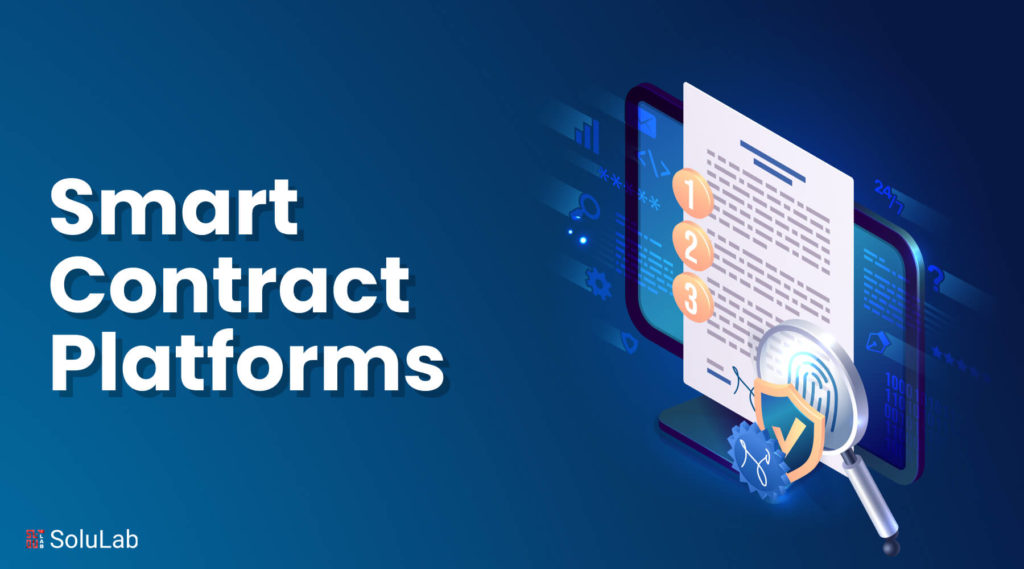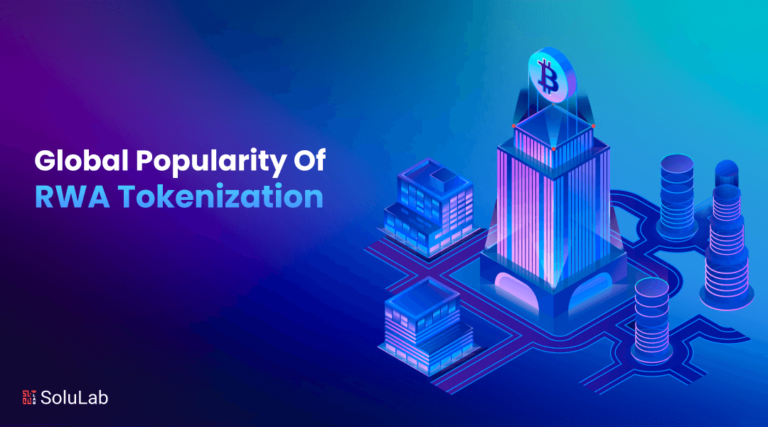
Struggling to choose the right smart contract platform? With so many blockchains claiming to be the fastest, cheapest, or most secure, it’s easy to get overwhelmed. Whether you’re building a DeFi app, launching a token, or creating a game, picking the wrong platform can lead to high gas fees, slow transactions, or limited developer support.
However, not all smart contract platforms are created equal. Some are perfect for enterprise-grade apps, while others shine in speed or scalability. In 2025, the competition is fiercer than ever, new players are entering the space, while existing ones are upgrading their ecosystems.
| In 2025, the global smart contracts market is projected to expand from $2.63 billion in 2024 to $3.21 billion, marking a CAGR of 22%. |
To save you hours of research, we’ve listed the Top 7 Smart Contract Platforms worth your attention in 2025. This guide breaks down what makes each one unique, covering everything from security and scalability to developer tools and ecosystem growth.
What Are Smart Contracts?
To put it simply, smart contracts are electronic contracts that take automated action when certain criteria are met. The main distinction between them and regular contracts is that they are encoded and kept on a blockchain.
In essence, a smart contract is a computer program that, under specific circumstances, automatically regulates the transfer of digital assets between parties. They make agreements unchangeable and impenetrable by automating communication between the sender and the recipient.
Types of Smart Contracts
In the realm of blockchain technology, smart contracts are becoming more and more widespread and are altering the way we conduct transactions. However, did you realize that there are several types of smart contracts?
The following is a list of several types of smart contracts that may be made with various Smart Contract platforms:
1. Smart Legal Contracts
Smart legal contracts are the first item on our list. These are basically standard legal contracts with additional smart contract features.
They comprise certain terms and conditions that, upon fulfillment of predetermined criteria, are automatically carried out. This can greatly expedite judicial proceedings and lower the possibility of misunderstandings or human mistakes.
2. Decentralized Autonomous Organizations (DAO)
One kind of smart contract that makes it possible to create leaderless groups is called a Decentralized Autonomous Organization, or DAO.
These companies are fully decentralized on blockchain technology and are administered by computer programs that provide regulations.
Because DAOs do away with the necessity for a centralized authority, decision-making procedures may be more fair and transparent.
3. Application Logic Contracts (ALC)
The Application Logic Contract (ALC) is a different smart contract. The logic of decentralized apps (dApps) is managed by these contracts.
For example, they can oversee the voting procedure in a DAO or set the rules for a game that runs on the blockchain.
Developers may now create intricate apps on top of blockchain networks because of ALCs.
4. Token Contracts
One kind of smart contract that controls the production and distribution of digital tokens is the token contract. From cryptocurrencies like Bitcoin or Ethereum to distinct digital assets like Non-Fungible Tokens (NFTs), these tokens may represent a wide range of assets.
Token contracts guarantee a safe, regulated environment for the creation, transfer, and destruction of tokens.
5. Marketplace Contracts
Finally, we have marketplace contracts. Decentralized markets employ these smart contracts to make transactions easier. They are capable of managing reputation management systems, handling escrow services, and automating the purchasing and selling process. Decentralized e-commerce is made possible in part via marketplace contracts.
To put it briefly, there are several variations of smart contracts, each with specific uses and advantages. Digital contracts have the potential to revolutionize our interactions with the digital environment by facilitating decentralized organizations and expediting legal processes.
Things to Consider to Select the Best Smart Contract Platforms
When evaluating the best smart contract platforms, there are a few key criteria to consider. These include:
1. Scalability: The platform must be able to handle a large number of transactions without sacrificing performance.
2. Security features: The platform must have strong security features to protect against attacks, especially when using infrastructures such as bsc rpc that require consistent and secure connectivity.
3. Developer-friendliness: The platform must be easy for developers to use so that they can quickly and easily build decentralized applications.
4. Decentralized Applications: The platform must be able to support a variety of decentralized applications, including those with different requirements in terms of scalability, security, and functionality.
These criteria are important because they ensure that the platform is capable of supporting the needs of decentralized applications. A platform that is not scalable, secure, or developer-friendly will not be able to support the most demanding decentralized applications.
In addition to these criteria, it is also important to consider the overall ecosystem of the platform. This includes the availability of tools, documentation, and support. A platform with a strong ecosystem will make it easier for developers to build decentralized applications.
By considering all of these factors, you can choose the best smart contract platform for your needs.
Top 7 Smart Contract Platforms to Consider in 2025

1. Ethereum
Ethereum is the smart contract platform and remains the most used in 2025. It offers a mature ecosystem, a strong developer community, and high security. Key features include EVM compatibility, extensive DApp support, Layer 2 scalability solutions, and decentralized governance.
With billions in Total Value Locked (TVL), it's a go-to choice for DeFi projects and NFT platforms. Best suited for developers, startups, and enterprises seeking a robust, battle-tested foundation for building decentralized applications.

2. Binance Smart Chain (BSC)
Binance Smart Chain (BSC) is a high-performance blockchain developed by Binance to support smart contracts and decentralized apps (dApps). It offers fast transactions, low fees, and compatibility with Ethereum through the EVM (Ethereum Virtual Machine). Key features include a dual-chain architecture, strong community support, and high scalability.
BSC is ideal for developers and users looking for affordable DeFi solutions, NFT platforms, and quick dApp deployment. It’s best suited for startups, retail users, and developers wanting to scale fast without high gas fees.

3. Cardano
Cardano is a research-driven smart contract platform known for its focus on security, scalability, and sustainability. Built on peer-reviewed academic research, it uses a unique proof-of-stake consensus called Ouroboros.
Key features include low energy usage, formal verification for smart contracts, and high interoperability. It’s suited for long-term projects in education, healthcare, and government sectors that value stability and precision.

4. Solana
Solana is a high-performance smart contract platform known for its fast transaction speeds and low fees. Designed for scalability, it can process over 65,000 transactions per second, making it ideal for DeFi apps and NFT projects.
Key features include its Proof of History consensus, low gas fees, growing developer ecosystem, and high throughput. Solana is best suited for developers building large-scale dApps, traders looking for speed, and creators launching NFT marketplaces that need efficiency without sacrificing performance.

5. Polkadot
Polkadot is a next-generation smart contract platform designed to enable multiple blockchains to operate together. Known for its unique parachain architecture, Polkadot ensures scalability, speed, and flexibility. Key features include interoperability, shared security, customizable blockchain development, and low fees.
It’s ideal for developers building cross-chain applications, startups seeking scalability, and enterprises focused on security. With its growing ecosystem and strong community support, Polkadot is a top choice for anyone looking to build powerful decentralized solutions in 2025.

6. Avalanche
Avalanche is a high-performance smart contract platform known for its speed, low fees, and eco-friendly approach. It supports custom blockchains and decentralized applications (dApps) with near-instant finality. Key features include subnets for scalability, Ethereum compatibility via the C-Chain, and low energy consumption.
Avalanche is ideal for developers building DeFi apps, enterprises looking for customizable blockchain networks, and users seeking fast, cost-effective transactions. Its flexible architecture makes it a strong choice for both startups and large-scale Web3 projects in 2025.

7. Tezos
Tezos is a self-upgradable smart contract platform known for its energy efficiency and strong governance model. Unlike many blockchains, Tezos allows seamless upgrades without hard forks, ensuring long-term adaptability. It supports formal verification for secure smart contracts, making it ideal for high-stakes industries.
With low transaction fees and eco-friendly proof-of-stake consensus, it's a top choice for developers, enterprises, and environmentally conscious projects. Tezos is best suited for those prioritizing sustainability, on-chain governance, and security in smart contract development.

Conclusion
In 2025, smart contract platforms will play a crucial role in the future of decentralized applications, finance, and innovation. Whether you’re a developer, investor, or tech enthusiast, choosing the right platform can make all the difference. From Ethereum’s ecosystem to Solana’s blazing speed and Cardano’s academic approach, each platform offers unique strengths.
By staying informed and aligned with your goals, you can leverage the power of smart contracts to build, invest in, or support the next wave of blockchain innovation. SoluLab, a smart contract development company, can help you select the best platform as per your business requirements. Contact us today!
FAQs
1. Why is Ethereum often considered the pioneer in smart contract platforms?
Ethereum, launched in 2015, introduced the concept of smart contracts in blockchain development. Its robust and versatile platform has been the foundation for countless decentralized applications. Despite challenges like scalability, Ethereum remains a pioneer due to its vast developer community, rich ecosystem, and ongoing improvements, such as Ethereum 2.0.
2. How do Binance Smart Chain and its BNB token play a role in the smart contract landscape?
Binance Smart Chain (BSC) is a blockchain network closely associated with Binance, one of the largest cryptocurrency exchanges. BSC enables faster and cheaper transactions compared to Ethereum. However, concerns have been raised about its centralization. The BNB token is the native cryptocurrency of Binance and is integral to the BSC ecosystem.
3. What makes Solana stand out among smart contract platforms?
Solana distinguishes itself with its high-performance blockchain, capable of processing thousands of transactions per second. Its unique consensus mechanism, Proof of History (PoH), contributes to its exceptional speed. Solana aims to address scalability issues, making it an attractive choice for decentralized applications requiring rapid and cost-effective transactions.
4. How does Polkadot’s interoperability feature impact the smart contract landscape?
Polkadot focuses on interoperability, allowing different blockchains to connect and share information seamlessly. Its relay chain serves as a bridge between blockchains, fostering a more interconnected and collaborative blockchain ecosystem. This interoperability can enhance scalability, security, and overall functionality.
5. What role do Smart Contracts Development Services play in the blockchain industry?
Smart Contracts Development Services, offered by companies like Solulab, are essential for creating, auditing, and deploying smart contracts. These services provide expertise in coding secure and efficient contracts tailored to the needs of decentralized applications. Collaborating with a reliable development service ensures the successful implementation of smart contracts.
6. How can one choose the right smart contract platform for a specific project?
Choosing the right smart contract platform involves assessing factors such as scalability, security, transaction speed, and the specific requirements of the project. Developers and businesses should consider the strengths and weaknesses of each platform, keeping in mind the goals and functionalities of their decentralized applications.




